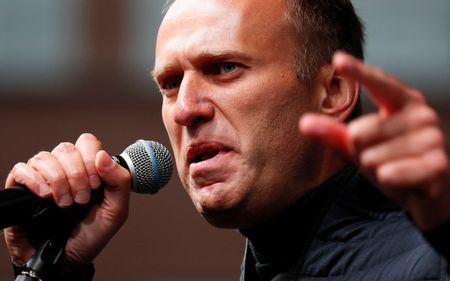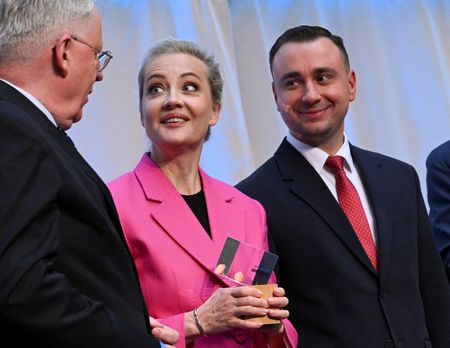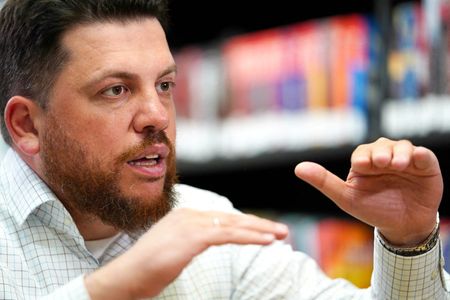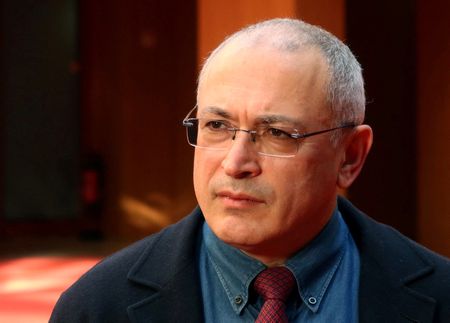By Andrew Osborn and Lucy Papachristou
LONDON (Reuters) -Splits in Russia’s opposition in exile have widened sharply, shifting their focus from political activism to infighting after allies of late opposition leader Alexei Navalny accused another opposition figure of ordering attacks on their activists.
The scandal undermines already troubled efforts to forge a united front against the Kremlin, risks damaging the opposition’s credibility in the eyes of supporters and the West, and pits the two most high-profile opposition groupings against one another setting up a potentially protracted standoff.
The two opposition movements – one run by allies of the late Navalny and the other run by Kremlin critic Mikhail Khodorkovsky, have been involved in public disputes before, but their latest disagreement is the most potent yet, with the Navalny camp publicly accusing Leonid Nevzlin, an Israel-based tycoon and Khodorkovsky ally, of ordering assaults on senior Navalny aides Leonid Volkov and Ivan Zhdanov and on the wife of an Argentina-based activist.
In the most serious incident, Volkov was attacked outside his house in Vilnius, Lithuania in March this year, a month after Navalny died in an Arctic prison, by a hammer-wielding assailant who he said had left him with a broken arm and a badly damaged leg.
In a nearly one-hour long video investigation published on Navalny’s YouTube channel on Thursday, his team alleged that the assault and two others had been ordered not by the Russian state, but by Nevzlin.
Both Nevzlin and Khodorkovsky, who himself spent a decade in Russian prisons on what the West said were politically-motivated charges, dismissed the claims as groundless.
With Navalny dead, the opposition has been left without a clear leader. His widow, Yulia Navalnaya, has vowed to continue his work and has pushed for President Vladimir Putin to leave the Kremlin while senior Navalny aides continue to investigate the circumstances of her husband’s death.
“This is a really serious blow against the (anti-Kremlin) protest movement,” Ivan Zhdanov, one of the Navalny activists attacked, said in an online discussion on the subject late on Thursday.
“It’s hard to think of how he (Nevzlin) could have done anything more serious. Every time in future when there’s an attack, people will wonder if Putin, Russian intelligence, or some opposition figure is behind it.”
DISSIDENT CIRCLES EXPRESS SHOCK
Navalny’s movement, the Anti-Corruption Foundation (ACF), said it had shared its investigation with law enforcement in countries where Nevzlin travelled. The Lithuanian General Prosecutor’s office declined to say if it had received any material from the ACF but said an inquiry into the Volkov attack was ongoing.
Responding on X, Nevzlin said the allegations looked like they had been cooked up in Moscow and were similar to those made by Russian state media.
“Let an independent investigation first evaluate these so-called ‘materials’ and, if the investigation deems it necessary, then a court in a democratic country,” he wrote.
Khodorkovsky condemned the attacks on the activists but defended Nevzlin, saying the accusations looked like they originated in Russia’s intelligence services.
“If the ACF wants to accuse me of something, they can go to court. Not slyly crap on my reputation,” Khodorkovsky said.
Many in Russian dissident circles took to social media to post shocked, often expletive-ridden reactions to the news. But some cautioned that the revelations changed little, and were a distraction from the central task of defeating Putin.
“No matter how much damage the squabbles cause, this damage doesn’t determine anything,” said University of Chicago economist Konstantin Sonin, who is on Russia’s wanted list for criticising the war in Ukraine.
“The opposition has in no sense been the solution to any key issues,” he wrote on X. Its real task, Sonin suggested, was “to get back to the basic questions – how to stop the war? How to get rid of Putin and dismantle the regime?”
(Reporting by Andrew Osborn and Lucy Papachristou in London;Additional reporting by Andrius Sytas in Vilnius;Editing by William Maclean)













